ANALYSIS: Kristoph, Klavier and the Gavin Dynamic
ooc; So.
This has been a long time coming, but really, it was only inevitable. I just need to get all these thoughts out of my head and now is as good a time as any. Here you go; this is my proof that I’m not just banging pretty men rocks together over here.
Fair warning: this is very, VERY long. As in, more than 3000 words long. Sorry.
Apollo Justice is my favourite game in the Ace Attorney series; the subtle characterization of much of the cast was incredibly appealing to me. Of all the new characters in this rich cast, by far the most fascinating–at least in my opinion–are Kristoph and Klavier Gavin; brothers who share a bond far more complex than I think many people realise.
I will begin by analysing the brothers individually and then their relationship as a whole. I’ll later be writing another analysis based on their body language and their key locations (Solitary Cell 13, Klavier’s office and possibly the Gavinners dressing room).
We’ll start with Klavier.

fräulein, fräulein, fräulein, ja, ja, ja
As we know, Klavier Gavin is the game’s prosecutor as well as being the adored frontman of hit band “The Gavinners”. Charming, playful and effortlessly flirtatious, he’s a brilliant foil to Apollo, the game’s fairly uptight, no-nonsense protagonist. Klavier is first introduced when Apollo and Trucy are investigating in Turnabout Corner, and it is through them (though mainly Apollo) that our understanding of him is formed.
One of the most interesting aspects of Klavier’s personality, and one that I feel is frequently glossed over, is his attitude to women. Though many fans are quick to defend him on this count, it’s incredibly obvious from my perspective that Klavier’s treatment of the fairer sex borders on misogyny. This is particularly apparent through his treatment of Ema Skye, a detective who works in close proximity to him. Ema complains of Klavier “getting in the way” and distracting her as she works, and also of his haughty behaviour. Klavier refers to Ema (and, in fact, most women) as “Fräulein”; literally “little woman”, a diminutive German honorific generally used for young, unmarried women. It is, in fact, considered impolite when the lady in question has not asked to be referred to as such, and is considered outdated by the standards of many. It is likely that most of the American women Klavier addresses in this fashion don’t know this–and, in fact, probably get a bit of a kick out of a good-looking rockstar speaking foreign languages to them–but it is interesting that he would choose his words in this fashion.
Klavier’s sexism is most apparent in Turnabout Serenade, when he neglects to inform Ema–his coworker–of important case details, effectively humiliating her on the stand. When she demands an explanation, he simply responds that he didn’t think it was important, laughs at her and then apologizes… insincerely.

u mad, fräulein?
Throughout the game, Klavier’s relations with women seem very false. He appears to have very little faith in their abilities (as evidenced by his interactions with Ema) and humors them only when they appear to find him attractive (as evidenced by his interactions with his fans, and occasionally Trucy). The exception to this rule appears to be Lamiroir, who Klavier performs with and speaks highly of.
As Klavier claims right from the get-go, he’s accustomed to being adored by women and as such, takes them somewhat for granted unless they have proved themselves to him in a field relevant to his own interests (such as Lamiroir).
But how much of Klavier’s outward behaviour is legitimate and how much is staged? Klavier himself admits that his rockstar persona and his prosecutor persona are just that. He even offers Apollo a choice between “which Klavier” he talks to. No; I am not about to make a case for Klavier as a sufferer of multiple-personalities. Instead, I’d like you to consider exactly how much of Klavier’s outward arrogance and charm could be a total lie.

craaaaawwwwling iiiiiinnnn mein skiiiiiin
One of the most interesting Klavier scenes occurs in Turnabout Serenade, where Apollo and Trucy visit Klavier in the Prosecutor’s Office after the disastrous Guilty As Charged concert, in which one of Klavier’s beloved guitars goes up in flames during a song. Here, we see a glimpse of Klavier’s hidden depth. This is the scene where he offers this interesting exchange:
Klavier: So, who have you come to see? Trucy: Huh? Klavier: Klavier, lead vocalist for the Gavinners? Klavier: Or Prosecutor Gavin, scourge of the courtroom?
While I will not delve too deeply into this at this time, I’d like you to take note of this small detail.
When referring to his stage career, Klavier uses only his first name to describe himself. However, when referring to his courtroom persona he uses his family name. With that said, Klavier’s band is called “The Gavinners” (or “Garyuu Wave” in Japanese) which is also an obvious nod to his surname. Note that Klavier does not ask if Apollo has come to see him. He has already mentally distanced himself from the situation by offering a conversation with either “persona” rather than himself.
Klavier became a much more interesting character to me once I realised that a great deal of his behaviour is very likely false. As an example, I’d like to point out a small, but noticeable lie he tells to Daryan; his bandmate, coworker and alleged friend.
Daryan: "The Guitar's Serenade", eh? Classic tearjerker, that one. Trucy: You don't think he based it on a real experience, do you? Daryan: Probably not. He writes by feeling, more than memory. Trucy: Ooh! You mean the songs just kind of "come to him"? Daryan: Yeah, something like that. I guess you could call him a genius. Daryan: Of course he changes the song and lyrics on a whim. Drives me up the wall. Apollo: He makes his court cases on a whim sometimes, too. Daryan: He changed the lyrics to a song just before a recording the other day, even. Daryan: Wants to put in this line about a university student obsessed with girls. Whatever!
Anyone who has played Apollo Justice may find it difficult to erase Wesley Stickler, the infamous panty-snatcher of Turnabout Corner, from their minds. Apparently, so does Klavier… but it seems Daryan hasn’t been let in on this. It seems insignificant, but it says a lot about what a private person Klavier really is in spite of his apparently extroverted nature.
And what if none of Klavier’s songs are an accident? The Guitar’s Serenade? Guilty Love? My Boyfriend Is The Prosecution’s Witness?
Atroquinine, My Love?
Speaking of which…
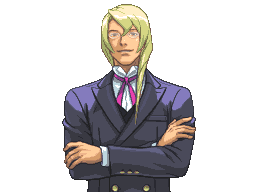
might you lick this stamp for me?
Kristoph Gavin is the main antagonist of Apollo Justice. His confident, unfazed demeanour earned him the nickname “The Coolest Defense In The West” and in my book it is exactly this that makes him one of the most brilliant villains in the Ace Attorney series. Over the course of the game, Kristoph succeeds in dispatching two–very nearly three–victims through a series of convoluted plans.
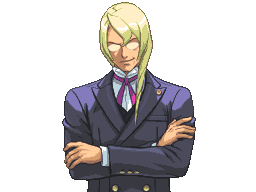
and I would have gotten away with it too, if it weren’t for you meddling lawyers!
As a human being, I would like to sympathise with Kristoph… and I am quite sure that Kristoph would like me to sympathise with him, too. In fact, it is in this manner that Kristoph effectively deceives his victims, most notably Vera (whose silence he buys with a stamp of her favourite magicians and a “magical” bottle of poisoned nailpolish) and Apollo (who initially views him as a somewhat intimidating yet brilliant mentor). The important thing to realise about Kristoph, and what once again many fans are unwilling to admit, is that he is unconscionable and utterly merciless. The problem is that human nature drives us to seek a reasonable explanation for behaviour that falls outside our moral boundaries; we want to know if Kristoph could have had a good reason for doing what he did, if he may have been justified, because maybe–just maybe–if we know why he did it, it will seem less horrific.
Interestingly, this is an idea that also applies in reality. For example, in a social experiment in which the profiles of publicly known murderers were put onto dating websites such as eHarmony, they received an incredible–and disturbing–response. Other site users actually wanted to correspond and form romantic relationships with these people, knowing that they had been imprisoned for heinous crimes.
People like Kristoph exploit this. They rely on the inherent goodness of most human beings to achieve their end. They actually do not have a hidden heart of gold… but if you believe they do, then you are playing right into their hands.
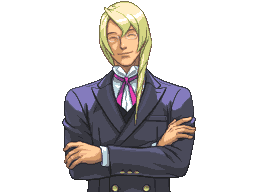
One of the most disturbing things about Kristoph is the degree to which he meticulously plans his crimes, especially the Misham murder. In case you need a refresher, here you are:
- Kristoph is hired to defend Zak Gramarye.
- Realizing that framing Valant for the crime is his best bet at a win, Kristoph decides to hire Vera Misham to forge evidence for him.
- Kristoph approaches the Mishams. He has his face covered when he speaks to Drew and tells his plans only to the forger, Vera.
- Taking advantage of Vera’s agoraphobia, and having noticed that she bites her nails when nervous, Kristoph presents her with (poisoned) nail polish, telling her it is a “good luck charm” in case she has to go outside.
- Ergo, Vera will go outside, use the nail polish as a good luck charm… then bite her nails if she is put under pressure, resulting in her inadvertent ingestion of atroquinine (lethal dosage 0.002mg; for comparison, the lethal dosage of cyanic acid is 50mg).
- To ensure the success of his trap, Kristoph also makes to kill Drew Misham by sending an atroquinine-coated stamp along with his payment with instructions to use it for the return letter; which, as screencaps from the game can show us, was sent to a false name and probably address.
In case it isn’t already obvious, this clearly shows that Kristoph is absolutely obsessed with control. It wasn’t as if he needed to kill the Mishams; they were forgers by trade and had no reason to ever turn him in. However, refusing to take the chance, he immediately opts to kill them… and really, it is only the game’s unique circumstances that resulted in the failure of his plan.
When Kristoph is fired by his client, his tirade continues. Not missing a beat, he passes the evidence on to the client’s eight year old daughter to give to his defense and gets his genius prosecutor brother to deal with the case.
And that’s where it gets interesting.
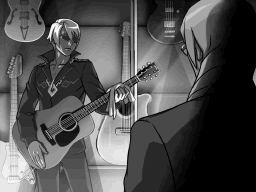
Kristoph refuses to trust a twelve-year-old girl who is terrified of leaving her own home; however, he does trust Klavier.
Kristoph’s apparent “trust” of other characters can all be explained away. He trusted Trucy not to tell anyone about him because she was a child and not old enough to understand the situation, and trusted Apollo (to an extent) because he believed that he would do as he was told without asking questions. We must remember that it is very strongly implied that Kristoph stalked everyone involved with Magnifi’s murder case–including but not limited to Phoenix, Brushel, Valant and the Mishams–for seven entire years.
The reason for this once again links back to Kristoph’s love of control. These people (Phoenix and the Mishams) in particular had acted outside of his expectations and he monitored them closely so he would be able to decide when to act. However, there is one person who does not fit into this equation.
Klavier was not monitored closely by Kristoph during the seven-year timeskip. It’s likely that they interacted during this time, of course (they’re related and live in the same city and work in the same profession, so, well… duh), but what is interesting is that Kristoph had no system set in place in the event of Klavier’s betrayal. He was in prime position to do so, of course; Kristoph can easily walk into Klavier’s office in the middle of the night, so it’s reasonable to assume he might have had access to Klavier’s home and would have had boundless opportunities to employ a safety net.
But he didn’t.
Why?
It seems insignificant, but think about this. Klavier is a prosecutor at the age of seventeen. It takes an estimated absolute minimum of five years to complete law school and pass the bar exam. This means that Klavier was entering university at age twelve at the oldest.
It is one thing to trust a rookie attorney or an eight-year-old child. It is another to trust a genius, whose capabilites you ought to be well aware of.

E = mc2, ja?
Can we chalk Kristoph’s trust of Klavier down to something as simple as familial love? The answer is a resounding no. This is a man who kills people’s fathers and tries to poison little girls with social phobias. As I said before, Kristoph is without a doubt merciless and quite possibly incapable of mercy toward anyone. He is dismissive of his crimes and views them as means to an end, so to speak. It is very unlikely that he would trust even his own brother without a very good reason.
Fortunately, he has one.
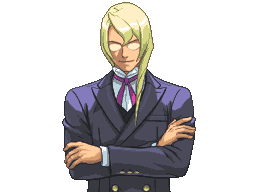
oh, brother dearest…
Kristoph seems to generally trust people who too stupid to realise he is manipulating them. This applies to most, as Kristoph clearly views himself as superior to basically everyone; his breakdown speaks for him. However, as I mentioned earlier, it is impossible for this to apply to Klavier.
Therefore, there is only one possible explanation for Kristoph’s trust of Klavier.
Control.
Klavier had seven years in which he could have come forward with information about Kristoph’s tip; information with which lives could have been saved, which could have resulted in Kristoph being brought to justice sooner. However, in spite of admitting to having misgivings (he wonders aloud in the final trial of AJ how Kristoph knew so much, and why his brother would suddenly tell him all these things) he kept quiet.
To emphasise my point, here is a list of things Klavier has done for his brother:
- Kept quiet about the details of an extremely important tip, as I said.
- Was rude to Phoenix (Kristoph told Klavier not to give him the benefit of his respect; Klavier was brazen and rude to Phoenix in his first trial).
- POSSIBLY: Shared information with Kristoph while Kristoph was in prison. There is evidence to suggest this in canon. For example, Kristoph is exceptionally well-informed about the details of the Misham trial when he is called in as a witness and demands an explanation from Klavier when it is revealed that the trial is being conducted under the new jurist system. His expectation that Klavier should have mentioned this does suggest that Klavier has told him other things about the case.
Here is a list of things Kristoph has done for his brother:
- Chastise him in court, pulling him up on every slip (berating him for not objecting to various parts of Apollo’s crossexamination etc.)
- Generally insult him on various occassions, implying his worthlessness and ineloquence.
- In essence, SWEET BUGGER ALL.
(I am not counting Kristoph sharing information with Klavier before the Gramarye trial, as Kristoph did not do that for Klavier. He did it for himself. Period.)
It is very clear where the power lies in this relationship.
Such control is not simply an overnight thing. Kristoph clearly continued to have control over Klavier even after he was incarcerated, and this control was already established before Kristoph’s “tip” before Klavier’s first trial. This is why Kristoph trusts Klavier; because he believes he can control him completely.
This is different to a manipulative relationship between colleagues, supposed friends or even lovers. Kristoph and Klavier are brothers. In spite of the 8 year age gap, they almost definitely grew up together, meaning Kristoph has literally had Klavier’s entire life to establish control over him.
There’s something else that makes things even more disturbing.
Judge: I feared that you might still be distraught over that one trial... Klavier: Not to worry, Herr Judge. Klavier: I wouldn't miss this day in court for the world. Klavier: It's worth even more than VIP passes to one of my concerts, ja? Klavier: How could I pass up a chance to see the true strength... Klavier: ...of the little boy who bested my brother?
I have bolded the parts that are most significant to me. The Judge mentions that Klavier has recently been “distraught” over a certain trial, which is very obviously the trial in which Kristoph was incarcerated. This is the only possibility simply because had Klavier been distraught over some other random trial that we never saw it would be poor writing and because it wouldn’t make sense for it to be the trial of seven years ago (aside from the fact that the trial technically had no resolution, Klavier did win that trial, or at least would have, and was overall very successful. In addition, it is infeasible even by Ace Attorney standards for a prosecutor to participate in ONE trial, swan off with his rock band for seven years, and slot back immediately into the system unquestioned).
So, here is conclusion #1: Klavier was distraught over Kristoph’s arrest (although it is possible, at a stretch, that he was still upset over the Magnifi trial).
Klavier’s other remark in this is very interesting. He views Apollo as having “bested” his brother, rather than having caught Kristoph doing something wrong and apprehending him.
This leads me to, conclusion #2: Klavier believed Kristoph was innocent.
This is reinforced in Turnabout Succession where Klavier says that Kristoph is being “accused” by Apollo again rather than actually being caught out. This is interesting, because Klavier does not tiptoe around any other character in the game, even when caught off guard by Apollo. Kristoph is the only person to elicit this reaction from him, and other characters remark on it. My favourite example is this:
Trucy: What's wrong with Prosecutor Gavin? He looks clammy! Klavier: Evidence! Klavier: Evidence that shows this man, Kristoph Gavin, requested that forgery seven years ago! Kristoph: Klavier...? Klavier: Just... prove it! Klavier: Clear up these doubts now, or I swear, I'm off this case! Trucy: ...He must have thought of some evidence, Apollo! Apollo: (Prosecutor Gavin looks like he's in physical pain! That darkness...) Apollo: (...I have to pull that darkness out of him... And proof is the only way I can!)
Again, this speaks volumes of the control Kristoph must have over Klavier; he reacts emotionally and even physically to the idea of his brother as a criminal.
If that doesn’t disturb you, perhaps Kristoph’s reactions to Klavier’s distress might.
…Oh, wait.
Kristoph doesn’t react to Klavier’s distress. Throughout this scene he is presumably standing calmly on the witness stand thinking about what to have for lunch. Until…
Kristoph: Klavier... You're spinning out of control. Kristoph: Calm yourself before you say something you'll regret. Klavier: Spinning out of whose control? Mine? ...Or yours? Kristoph: Take a moment to consider everything you've built. Kristoph: Your reputation as a prosecutor... your fame with the masses. Kristoph: You could lose it all, Klavier.
This, unbelievably, makes everything even more disturbing. Although at first glance it seems that all is well, notice Kristoph’s final line. This man has–or believes he has–serious dirt on his brother. I am not talking “embarrassing baby photos” dirt. I mean real, dark, gritty dirt. Possibly with suspicious white fragments in it.

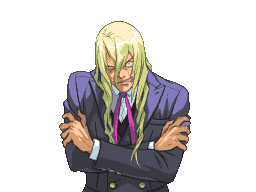
and so it ends…
Unfortunately, this is where canon stops. The curtains close with Klavier having faced Kristoph for the final time, and Kristoph having snapped beyond the possibility of repair.
The Gavin dynamic continues to be completely fascinating to me, though whether it will be expanded on in later Ace Attorney titles or simply built upon within fandom remains to be seen. You may notice that I didn’t cover the finale or Kristoph’s breakdown in this analysis, but as this already over 3000 words long I feel like perhaps that is better saved for another time. I apologize for the somewhat choppy writing, as there was a lot of information to be squeezed in and I fear I may not have expressed myself fluidly enough. Rest assured that since I have no life I will probably be doing more of these soon.
STILL TO COME:
Gavin Body Language and Environment
and most likely
Gavincest: Why it works–or rather, why it doesn’t

































